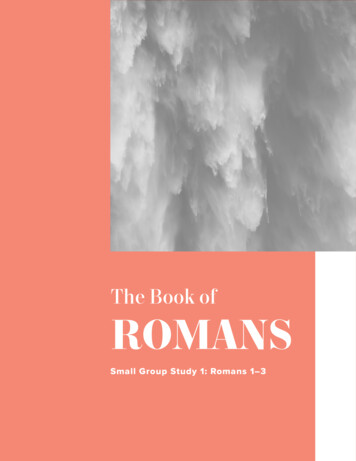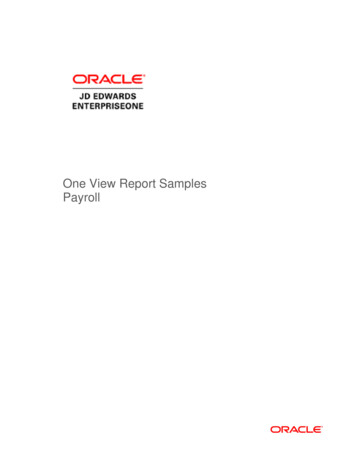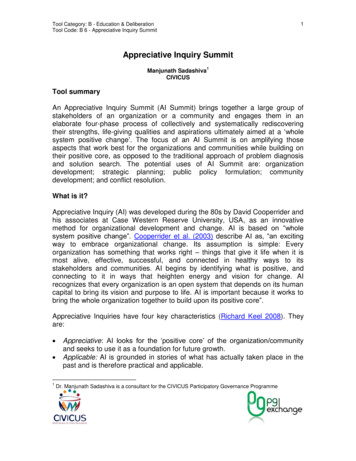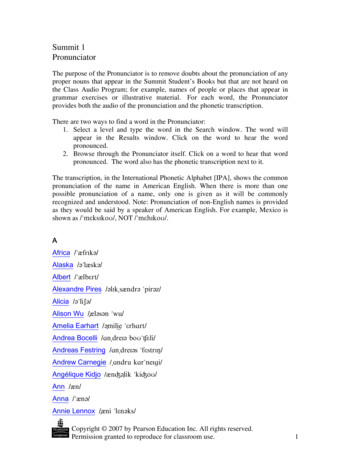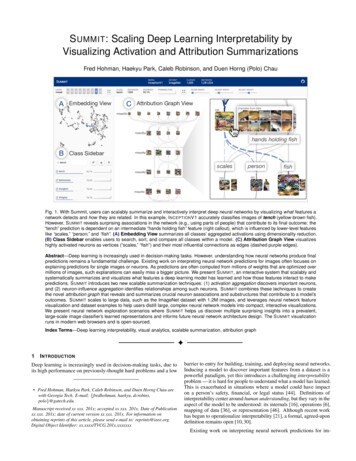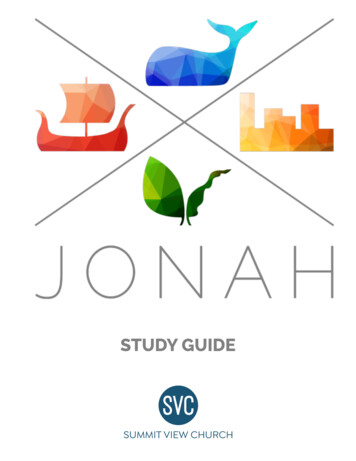
Transcription
STUDY GUIDESUMMIT VIEW CHURCH
INTRODUCTIONRegardless of one’s upbringing, almost all individualsare somewhat familiar with the book of Jonah. Whetherit’s a story they’ve been told from their children’sBible, or they’ve seen pop culture references, Jonahis one of the most recognized books of the Bible, andis definitely the best known of the minor prophets.While the book itself is only forty-eight verses, it hasdemanded a lot of attention. While most rememberthe story of the great fish, the work of our great Godoften gets overlooked.The story of Jonah is a historical record of somethingthat happened. He is the only prophet God sent to aforeign people. But there is far more to the book. Jonahis a satirical comedy. It tells the story of a prophet whofails in every single task given to him. God tells himto go east, and he heads west. God says go preach,and Jonah falls asleep. God saves lost people, and theprophet pouts in response.AUTHORIn 2 Kings 14:25, “Jonah son of Amittai” appears assomeone prophesying during the reign of JeroboamII (782-753 B.C.). Jonah’s ministry as a prophet hadalready served Israel well, as his message allowed thenation to prosper.D AT EHOW TO USE THISGUIDEThis guide has been specificallyprepared with you in mind. Thisguide will help life groups growdeeper together in relationship withGod and one another.Each week, there are a fewconversation starters to help getthings rolling, followed by questionsfor discussion based on the text.Each week wraps up with personalapplications and weekly challengesto help stretch you spiritually.Obviously, you are more thanwelcome to pull in other resources,or highlights from the sermon thepast week. But our hope is that byparticipating in this study, you willget a firmer grasp on the Scripturesand a deeper connection with Christ.While the book contains no time stamp within the text,many scholars believe the events that take place inthe book of Jonah occurred in the eighth century B.C.Many estimate the book of Jonah was written anywherebetween the eighth century and the end of the thirdcentury. The book was most likely written between thesixth and fourth centuries based upon the languageand descriptions used in the book.JONAH STUDY GUIDE - 1
NINEVEHJonah’s call was to head north and east, yet he attempted to head south and west. Jonah was called to goto Nineveh, in the heart of Assyria (modern day Iraq). Instead, he fled to Tarshish, a location potentially inSpain or in the Mediterranean near Italy—the opposite direction!At the peak of Nineveh’s prosperity, it was surrounded by a wall nearly eight miles in length. The peopleof Nineveh were everything opposite of what God’s people held dear. The Ninevites were known for theircruelty, killing men, raping women, ripping babies from wombs, and crushing children’s heads againstrocks. They often skinned their victims and impaled their bodies, leaving them to die. They often forcedparents to watch their children get burned alive before murdering the parents. They also buried victimsup to their necks in sand and left them to die of hunger, thirst, or wild animal attack. Entire cities wouldcommit suicide rather than fall into the hands of theNinevites.OUTLINE OF JONAHI.First Commissioning - Jonah atSea (Chapters 1-2)a. Jonah’s Initial Call (1:1-3)b. Jonah’s Rebellion andSubsequent Consequences(1:4-16)c. Jonah’s Deliverance (1:17-2:10)II.Second Commissioning - Jonahat Nineveh (Chapters 3-4)a. Jonah’s Second Call (3:1-3)b. The People of Nineveh’sResponse (3:4-10)c. The Angry Prophet’s Response(4:1-10)JONAH STUDY GUIDE - 2
MAJOR THEMES WITHIN JONAHGrace & MercyGod’s grace and mercy is on full display in the book of Jonah.Within this book, God shows grace and mercy upon the paganNinevites, the pagan sailors, and the rebellious prophet Jonah.Love of “Others”PURPOSEOF JONAHGod’s grace is muchbigger than we cancomprehend, and muchmore expansivethan what we arecomfortable with.What’s remarkable about the book of Jonah is the great carefor others that is on display. It’s clear from reading Jonah thatGod had an interest in expressing this love to others (Jonah4:2), yet God’s chosen instrument did not share in that sentiment. It appears he couldn’t care less about the sailors in theboat or the citizens of Nineveh; he was far more concernedwith his own comfort and preferences. Yet the sailors (1:14), their captain (1:6), and the king of Nineveh(3:9) expressed a deep concern, care, and love for others. This serves as a subtle rebuke toward thosewho know God; challenging them to think outside of themselves.MissionWhen grace, mercy, and love for the outsider meet, we find mission. While Jonah’s heart appears small,unmerciful, and uninterested towards unbelievers, we find that God is the opposite! God breaks downwalls and leads people out into the world with good news and forgiveness. The book of Jonah highlightsthe mission of God to reconcile people back to him.The Sovereignty of GodThroughout the book of Jonah, God’s supreme authority and control are on display. In Jonah,we see God control the storms (1:4), the lot (1:7), the great fish (1:17), the plant (4:6), the worm(4:7), and the winds (4:8).S U P P L E M E N TA L R E S O U R C E SHelpful Article: The Bible in One Verse by Dustin MesserBook: TheProdigal Prophetby Tim KellerChildren’sBook: Man onthe Run by TimAugustynThe Bible Project– JonahRight Now Media –The Book of Jonah byEric MasonJONAH STUDY GUIDE - 3
JONAH CHAPTER 1INTO THE STORMINTRODUCTIONJonah is often spoken of as if he was a “hero” in the Bible. But as wewill read and study in the coming weeks, Jonah doesn’t actually havemany qualities that we would want to emulate. In Chapter 1, we seeGod call Jonah to go to Nineveh and warn them of coming wrath ofGod. Instead fulfilling his calling, Jonah runs in rebellion, causinggrave consequences not only for himself, but also for others inhis presence.MAIN IDEA:“Most of uslike what Godsays, until we arecalled to action.– Eric MasonIt is impossible to run from God.C O N V E R S AT I O N S TA R T E RQ . Can you think of a time when God has prompted you to do something difficult orinconvenient? How did you respond?READ & DISCUSS JONAH CHAPTER 1Q . What do God’s initial call and Jonah’s response tell us about Jonah? What do they tell us about God?Follow Up: Is there someone in your life that incites the same feeling that Jonah had? If they were toshow up at church this Sunday, would their presence make you want to flee? Follow Up: What do wereveal about ourselves when we fail to love the “unlovable” in the way God has loved us?Q . In the midst of the storm, the men on the boat cried out to their “gods.” Instead of calling out to thetrue and living God, Jonah was fast asleep. When storms hit in your life, do you cry out to God, or attemptto rely on something else? Follow Up: Jonah is surrounded by pagans seeking deliverance while he isasleep at the bottom of the boat. Do you see any correlation between Jonah’s actions and yours as youinteract with unbelievers on a day-to-day basis?Q . In verse 9, Jonah describes God as the one who “made the sea and the dry land.” In light of that, hisattempt to flee seems quite foolish. Can you think of a time when you acted in a way that now seemsfoolish, considering what you know about God?Verse 13 is a key verse in this passage. Amid the storm, the sailors reached a point where they realized they could not save themselves, and turned to the Lord in verse 14. What storms are you facing?What is God breaking apart to wake you up spiritually? Where do you need to cease from trying to saveyourself?Q.JONAH STUDY GUIDE - 4
JONAH CHAPTER 1I N T O T H E S T O R M ( C O N T. )PERSONAL REFLECTIONA N D A P P L I C AT I O NDo you picture God as a God of the nations,or just your own little world? Is God’s grace limited to only good people?Q.Q . How are you running from God today?W E E K LYCHALLENGEThe instruction from the Lordcame to Jonah in a pretty clearand concise way. It wasn’t thatJonah didn’t understand, or asif God left it muddy for him tomisunderstand. His problemwas that he simply didn’twant to do it. This is often ourproblem as well.What would it take for us tocommit ourselves this weekto follow and obey where Godleads us?JONAH STUDY GUIDE - 5
JONAH C HAPTER 2DIVINE INTERRUPTION:GOD SPEAKS IN A FISHINTRODUCTIONJonah’s rebellion has finally caught up to him andhe’s starting to realize it. In this passage, Jonah criedout to God from the belly of a great fish. Here wearen’t simply reading a newspaper article reportingwhat happened, we get a glimpse into the humanexperience and personal struggle.MAIN IDEAWe are never far from the presence of God.He always hears the prayers of His people.C O N V E R S AT I O N S TA R T E RQ . Can you think of an unpleasanttime in your life where God used it torefocus your attention back to him?Some men arebrought to God bygentle means—they aredrawn by soft but mightybonds. Still, a much larger classof persons remains. They must notbe handled softly but must be dealtwith heavily. The picklock will neveropen their hearts—there must be thecrowbar, or even the battering ram.Some hearts can never becaptured for God and fortruth except by storm.“– Charles SpurgeonREAD & DISCUSS JONAH CHAPTER 2Q.According to verse 2, how does God respond to Jonah’s prayer of desperation?Why is it so important that we understand both our need for forgiveness (i.e., due to our sinfulness)and the immense breadth of God’s love (salvation comes from the Lord)? What happens if you neglect toacknowledge either of these?Q.Q . Verse 9 can be viewed as a theme of the entire Bible. Jonah declares, “Salvation belongs to theLord.” What do you think he means by this?Q . In this passage, God saves Jonah from an inward struggle before delivering him from externaldifficulties. Would you rather have God save you from an outward circumstance, or from an internalstruggle of sin? Would we rather be comfortable or holy?JONAH STUDY GUIDE - 6
JONAH C HAPTER 2DIVINE INTERRUPTION:G O D S P E A K S I N A F I S H ( C O N T. )PERSONAL REFLECTIONA N D A P P L I C AT I O NQ . Prayer is not simply receiving things that wewant from God. Prayer is more about aligning ourhearts, minds, and wills with God. How can wekeep the focus of our prayers on God’s will?Q . What is your biggest prayer need? Takeplenty of time to pray for each other.W E E K LY C H A L L E N G EJonah’s prayer in this chapter is a psalm of thanksgiving.Jonah thanks God for using the fish to save him fromdrowning. Take some time this week to compose yourown psalm of thanksgiving. This could be about a timeGod delivered you from trouble, brought you to Jesus, orsome other miraculous thing He has done for you.Other examples you can look at:Psalms 30, 34, 66, 73, 105-106, 111-118If you feel comfortable, consider sharing it with someoneclose, or your group next week.JONAH STUDY GUIDE - 7
JONAH C HAPTER 3OUR GOD IS A GODOF SECOND CHANCESINTRODUCTIONWhat’s the worst sermon you’ve ever heardpreached? My guess is that it’s probably noteven close to being as bad as the one Jonahpreached to Nineveh.After being vomited ashore, Jonah marches toNineveh to proclaim the message he has beensent to preach: repent or be destroyed. Yet itwasn’t the quality of Jonah’s message, but thequality of his God that turned the city back toHim.The biggest miracle in the story of Jonah isn’tthat he survived in a fish, but that an entirecity repents! Here we see a city – a people whowere far from God – repent of their sins. Godrelented from destroying them.MAIN IDEAGod is one of second chances. He forgives therepentant.C O N V E R S AT I O N S TA R T E RQ . Have you ever received a secondchance to do something that you hadpreviously failed at? How did that feel?Did you do anything differently thesecond time around?JONAH STUDY GUIDE - 8
JONAH C HAPTER 3OUR GOD IS A GOD OFS E C O N D C H A N C E S ( C O N T. )READ & DISCUSS JONAH CHAPTER 3Q . How does the structure of Jonah 3:1–3 parallel 1:1–3? What are the similarities? What are thedifferences?Q.How should Jonah’s experience encourage us towards obedience?Why do you think the Ninevites responded in the way they did? What did they recognize aboutthemselves?Q.The Hebrew word for “repentance” occurs four times in Jonah. All four of them are within the verseof 8-10, which signals the emergence of a new and important theme. What do you think that is?Q.How does God respond to the repentance of the Ninevites (3:10)? Follow Up: What does Hisresponse teach us about His character?Q.PERSONAL REFLECTIONA N D A P P L I C AT I O NW E E K LYCHALLENGEQ . Is God calling you into repentance today?What, if anything, is holding you back?As believers, God hascalled us to join Himon a mission in makingdisciples. Take some timeto think of people in yourlife who don’t know Jesus.Pray for them. Can youfind an opportunity thisweek to share the gospelwith them?JONAH STUDY GUIDE - 9
JONAH C HAPTER 4A M AT T E R O F T H E H E A R TINTRODUCTIONImagine an entire community or city turning to God, and suddenly filling the church. How would yourespond? One would hope that we would rejoice. Yet, in Chapter 4, Jonah provides a snapshot of apropensity in all of us. It would be inconvenient for us. We wouldn’t be able to claim our usual seat. We’dhave to open our homes to make room for the newcomers. We might not be served and catered to inthe way we would prefer. We might have to sit with people who hurt us.In this chapter, we get to see God’s desire for our hearts and His patience towards us.MAIN IDEAGod is gracious and compassionate, slow to anger, and abounding in love.C O N V E R S AT I O N S TA R T E RQ . When you were a little kid (or when youstill act like one), how did you (or, how do you)usually express your anger?JONAH STUDY GUIDE - 10
JONAH C HAPTER 4A M AT T E R O F T H E H E A R TREAD & DISCUSS JONAH CHAPTER 4Q . According to Jonah 4:2, why did Jonah flee to Tarshish (1:3)? Follow Up: According to 4:2, what isGod like? And why do you think Jonah has a problem with this?Q . Think back to week one of this series, where we read about Jonah’s experience on the ship. Howdoes Jonah’s attitude towards the Ninevites compare to the sailor’s attitude to him? How does God’scompassion compare to Jonah’s? Follow Up: Does this challenge the attitudes you have toward people?What does the interaction between Jonah and God in verses 3-4 teach us about our relationshipwith God?Q.Q.What do you think Jonah was waiting to see in verse 5?Q . In the closing verses of this chapter, we see God continually provide for His obstinate prophet.Follow Up: In your most stubborn times, how has God expressed grace and mercy in your life?Q.What do verses 10-11 teach us about God?PERSONALREFLECTION ANDA P P L I C AT I O NWe are much like Jonah. Wewant to receive God’s forgiveness,but we are not always willing toextend it to others. Who is it thatwe need to extend forgivenessto?Q.How is God calling you togrow in compassion for the lost?Q.W E E K LY C H A L L E N G EWhen God gave us grace, we receivedsomething we did not deserve. Thinkof someone in your life who doesnot deserve grace and be intentionalabout showing it to them over thecoming week. This can be a familymember, co-worker, neighbor, or evensomeone in your group!JONAH STUDY GUIDE - 11
NOTES
NOTES
The book of Jonah highlights the mission of God to reconcile people back to him. The Sovereignty of God Throughout the book of Jonah, God’s supreme authority and control are on display. In Jonah, we see God control the storms (1:4), the lot (1:7), the great fish (1:17), the plant (4:6), t
